Court Throws Out Lindsay Lohan’s Lawsuit Against Makers Of ‘Grand Theft Auto V’
She might have seen herself as a character in a video game, but Lindsay Lohan is just like us — in other words, not a video game character: a New York appeals court has chucked the actress’ lawsuit against the makers of Grand Theft Auto V that claimed her image had been used without her permission in the game.
Lohan’s lawyers accused GTA V developer Rockstar Games and parent company Take-Two Interactive Software of running afoul of New York’s right-of-publiclity law, The Wall Street Journal reports. That law forbids the use of a person’s portrait, picture, or voice for advertising or trade purposes without written consent from the subject.
The actress had a beef with two images:
• The “red bikini girl” on the GTA V box cover and intro to the game, which the complaint alleges looks a whole lot like Lohan, what with her hair, bikini style, and the “peace sign” symbol she’s flashing.
“The Plaintiff has been using the peace sign hand gesture for years before and after its use in the video game,” the lawsuit claimed.
• An image on the game disc of a woman being frisked by a cop (as seen at the top of this page) “capitalized on the use of [Lohan’s] clothes style…by using plaintiff’s fedora, sunglasses, jeans, white shirt, and jewelry.” What’s more, she’s wearing a shirt with the letter “L” “prominently displayed” on it, as well as a skull-shaped letter “O,” which, you know, Lohan.
The lawsuit also alleged that there was a Lohan avatar included in a player mission that revolves around a character trying to help a celebrity actress escape from paparazzi, a plot that that “contains identical events to the Plaintiffs life,” the complaint claimed. The side mission also includes a “voice impersonation” of Lohan.
A judge in Manhattan denied a motion to dismiss the complaint in March, but an appellate panel in the city disagreed and dismissed the lawsuit Thursday, ruling that the video game images in question aren’t advertising or trade.
“Even if we accept plaintiffs’ contentions that the video game depictions are close enough to be considered representations of the respective plaintiffs, plaintiffs’ claims should be dismissed because this video game does not fall under the statutory definitions of ‘advertising’ or ‘trade,’” the decision reads. “This video game’s unique story, characters, dialogue, and environment, combined with the player’s ability to choose how to proceed in the game, render it a work of fiction and satire.”
Even those images used in GTA V advertising are “not of Lohan herself, but merely the avatar in the game that Lohan claims is a depiction of her,” the panel wrote.
In the same decision, the court dismissed a similar lawsuit brought by Mob Wives star and daughter of imprisoned mobster Salvatore “Sammy The Bull Gravano,” Karen Gravano, claiming that a GTA character named “Andrea Bottino” was based on her without her consent.
Want more consumer news? Visit our parent organization, Consumer Reports, for the latest on scams, recalls, and other consumer issues.


